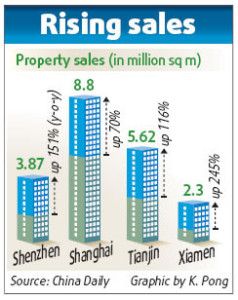in a recent article from China Daily, there was an amazing fact from The China Statistics Yearbook 2008 revealed. They found that the average home price in Beijing was 23 times a local family’s average income, compared with the international level of four to six times. Do you think they are setting themselves up for a MAJOR fall? Their government has come through with up to 30% discounts on mortgages for first time home buyers, but it doesn’t seem like that will be enough to make those loans truly a prudent investment over time.
China is also experiencing irrational property price increases. “One thing we are concerned about is whether there is a new bubble being shaped. While people have a strong perception of excessive liquidity and further price growth, the possibility of a bubble is pretty big,” said Gu Yunchang, secretary-general of the China Real Estate Association.
In just the past WEEK in Beijing’s Central Business District, residential property appreciated 6.5 percent, according to leading property broker Homelink.
“We used to talk about monthly price growth, but recently, it’s more about daily change,” a broker with Homelink said.
In Shanghai, developers of the luxury Tomson Rivers apartments, known for their price of more than 100,000 yuan per sq m ($14,000), sold 10 units in the first 25 days of June.
Before that, only four had been sold since the project was marketed in 2005.
In Guangzhou, the downtown housing price reached 11,200 yuan per sq m ($1,600) in May, close to the historical high of 11,574 yuan per sq m ($1,700) in October 2007, official statistics indicate.
And the average price of second-hand apartments reached an all-time high of 9,648 yuan per sq m ($1,400) in the same month.

The current momentum is in stark contrast to the stagnation the industry suffered a year ago, when government policies to curb overinvestment and market fear of overpricing led to sliding prices and shrinking transactions.
But the global financial woes prompted Chinese policymakers to ease the reins on the real estate industry, a key engine of the country’s GDP growth.
Last October, the central bank authorized banks to offer up to a 30 percent discount in mortgage rates to first-time homebuyers.
In May, the central government lowered the requirement on developers’ minimum capital fund from 35 percent to 20 percent of the entire investment needed.
Local governments also made other preferential policies, such as waivers of transaction duties. These incentives triggered a robust round of growth in property sales in major cities this spring.
I sure hope they have learned from our mistakes and not going to add yet another financial drain to the global economy.




